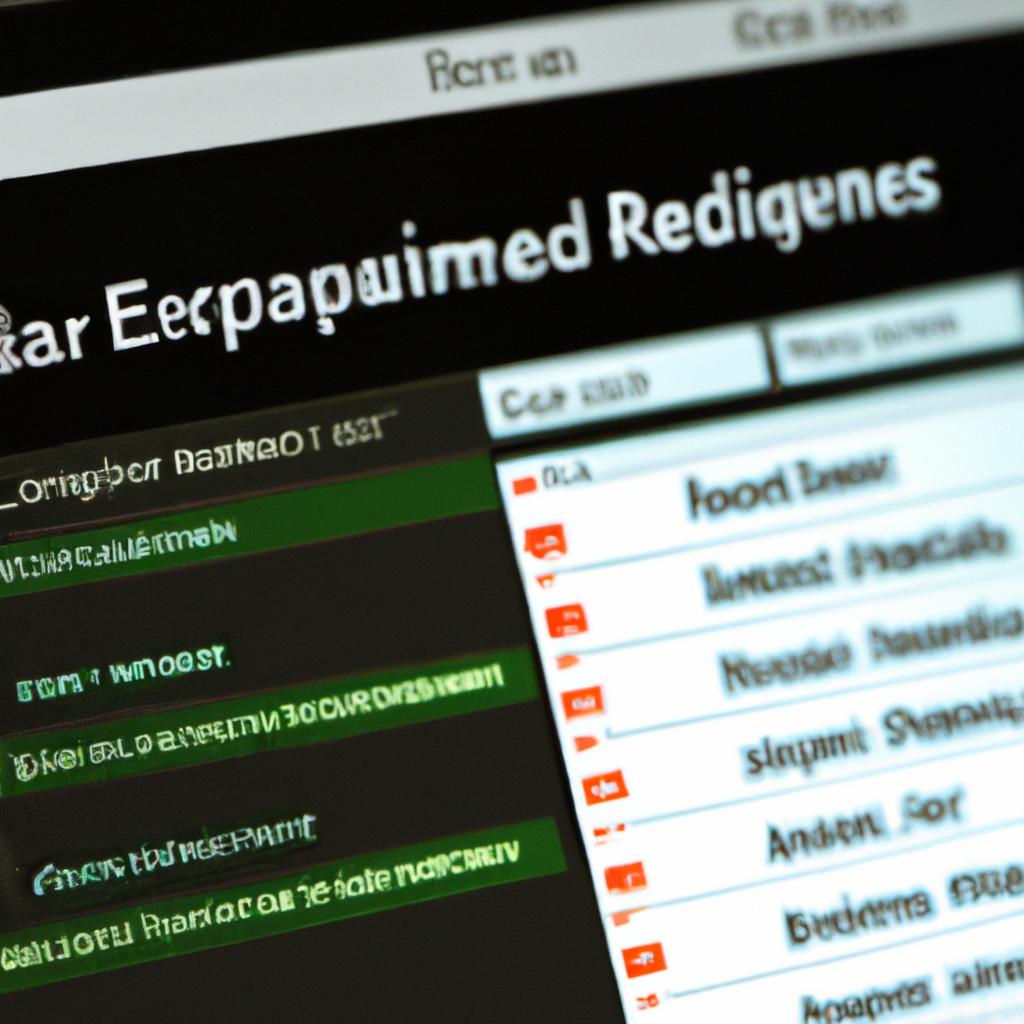In today’s fast-paced manufacturing landscape, businesses are constantly seeking ways to optimize their operations and gain a competitive edge. This is where Enterprise Resource Planning (ERP) manufacturing software solutions come into play. With their robust capabilities and comprehensive features, ERP software solutions have become indispensable tools for modern manufacturing businesses.
1.1 Defining erp manufacturing software solutions

ERP manufacturing software solutions are integrated systems designed specifically for the manufacturing industry. They streamline and automate various processes, such as inventory management, production planning, quality control, and supply chain management. By centralizing data and providing real-time visibility across the organization, ERP software empowers manufacturers to make informed decisions, improve efficiency, and drive growth.
1.2 Unveiling the Benefits
Implementing ERP manufacturing software solutions brings a plethora of benefits to organizations. Firstly, it enhances operational efficiency by automating manual tasks, reducing errors, and optimizing resource allocation. This leads to increased productivity and cost savings.
Moreover, ERP software solutions enable effective inventory management, ensuring optimal stock levels, minimizing wastage, and improving order fulfillment. Manufacturers can track inventory in real-time, streamline procurement processes, and avoid stockouts or overstock situations.
Additionally, ERP manufacturing software solutions facilitate seamless production planning and scheduling. Manufacturers can optimize their workflows, allocate resources efficiently, and meet production deadlines with ease. This leads to improved customer satisfaction and on-time delivery.
1.3 The Imperative of Choosing the Right ERP Software
Selecting the right ERP software for manufacturing processes is crucial. The software should align with the specific needs and requirements of the business. Factors such as scalability, flexibility, and compatibility with existing systems should be carefully evaluated. Furthermore, vendor support, training options, and the software’s ability to adapt to changing industry trends are essential considerations.
In conclusion, ERP manufacturing software solutions have revolutionized the manufacturing industry by streamlining operations, enhancing efficiency, and driving growth. By implementing the right ERP software, manufacturing businesses can stay ahead of the competition, improve productivity, and ensure long-term success. In the next section, we will delve deeper into the key features and functionalities of ERP manufacturing software solutions. Stay tuned!
Keywords: ERP manufacturing software solutions, streamline operations, integrated systems, operational efficiency, inventory management, production planning, scheduling, choosing the right ERP software, scalability, flexibility, compatibility, vendor support, training options.
2. Key Features and Functionalities of ERP Manufacturing Software Solutions
In the fast-paced world of manufacturing, efficiency and accuracy are paramount. ERP manufacturing software solutions offer a comprehensive set of features and functionalities that empower businesses to streamline their operations and achieve optimal results. Let’s delve into the key features that make ERP software solutions a game-changer for the manufacturing industry.
2.1 Inventory Management and Tracking
Inventory management is a critical aspect of manufacturing operations. ERP software solutions provide robust inventory management capabilities, allowing businesses to track inventory levels in real-time, optimize stock levels, and automate reordering processes. With accurate and up-to-date inventory data, manufacturers can avoid stockouts, minimize waste, and ensure a smooth supply chain.
2.2 Production Planning and Scheduling
Efficient production planning and scheduling are vital for meeting customer demands and maximizing resource utilization. ERP manufacturing software solutions offer advanced planning tools that enable manufacturers to optimize production workflows, allocate resources effectively, and create realistic production schedules. This ensures timely delivery, reduces downtime, and enhances overall productivity.
2.3 Quality Control and Assurance
Maintaining high product quality is non-negotiable for manufacturing businesses. ERP software solutions provide robust quality control and assurance functionalities, enabling businesses to establish standardized quality processes, automate quality checks, and track quality metrics. By ensuring consistent product quality, manufacturers can enhance customer satisfaction, reduce rework, and minimize product recalls.
2.4 Supply Chain Management
Efficient supply chain management is a key driver of success in the manufacturing industry. ERP manufacturing software solutions offer comprehensive supply chain management capabilities, enabling businesses to optimize procurement processes, manage suppliers effectively, and track shipments. By streamlining the supply chain, manufacturers can reduce costs, improve order fulfillment, and enhance overall customer satisfaction.
2.5 Real-time Data Visibility and Analytics
Data is a valuable asset for manufacturers, and ERP software solutions provide real-time data visibility and analytics tools. Manufacturers can access crucial data on inventory levels, production status, sales, and more, in real-time. This empowers decision-makers to make informed choices, identify bottlenecks, and optimize operations for improved efficiency and profitability.
2.6 Integration with Other Systems
Seamless integration with other systems is essential for a cohesive and efficient manufacturing environment. ERP manufacturing software solutions offer integration capabilities with other systems such as CRM and accounting software. This allows for smooth data flow, eliminates data silos, and enables a holistic view of the business. Integration ensures accurate data sharing, reduces manual data entry, and enhances collaboration across departments.
In the next section, we will explore the crucial factors to consider when choosing the right ERP manufacturing software solution. Stay tuned!
Keywords: ERP manufacturing software solutions, key features, functionalities, inventory management, tracking, production planning, scheduling, quality control, assurance, supply chain management, real-time data visibility, analytics, integration, CRM, accounting.
Choosing the Right ERP Manufacturing Software Solution
When it comes to selecting an ERP software solution for your manufacturing needs, there are several factors to consider. Making the right choice is crucial to ensure seamless integration and optimal performance within your organization. Let’s explore the key considerations to keep in mind.
3.1 Factors to Consider
Before diving into the selection process, it’s important to identify your specific manufacturing requirements and goals. Consider factors such as the size of your business, the complexity of your manufacturing processes, and the industry you operate in. Understanding your unique needs will help you narrow down the options and find the best-fit solution.
3.2 Scalability and Flexibility
As your business grows, so will your manufacturing operations. It’s essential to choose an ERP software solution that offers scalability and flexibility. This means ensuring that the software can handle increasing volumes of data, accommodate additional users, and adapt to evolving business needs. A scalable and flexible solution will save you the hassle of switching systems as your business expands.
3.3 Compatibility with Existing Infrastructure
Integrating an ERP software solution with your existing infrastructure and systems is crucial for smooth operations. Assess the compatibility of the ERP software with your current hardware, network, and other software applications. Seamless integration will prevent disruptions and data inconsistencies, allowing for efficient data flow across departments.
3.4 Importance of Vendor Support and Training Options
Choosing a reliable ERP software vendor that provides excellent support and training options is paramount. Ensure that the vendor offers comprehensive training programs to help your employees navigate the software effectively. Additionally, prompt and reliable support is essential for troubleshooting issues and ensuring uninterrupted operations. Look for vendors with a proven track record of customer satisfaction and ongoing support.
By carefully considering these factors, you can make an informed decision when selecting an ERP manufacturing software solution. The right choice will empower your manufacturing business to optimize processes, improve productivity, and achieve long-term success. In the next section, we will explore the implementation process of ERP manufacturing software solutions. Stay tuned!
Keywords: ERP manufacturing software solution, factors to consider, manufacturing requirements, scalability, flexibility, compatibility, existing infrastructure, vendor support, training options, seamless integration, reliable support.
4. Implementation Process of ERP Manufacturing Software Solutions
Implementing ERP manufacturing software solutions requires a well-defined process to ensure a smooth transition and successful adoption within the organization. Let’s explore the key steps involved in the implementation journey.
4.1 Pre-Implementation Planning and Preparation
Before diving into the implementation process, it is essential to conduct thorough planning and preparation. This stage involves identifying the specific goals and objectives of implementing the ERP software, understanding the unique requirements of the organization, and creating a comprehensive implementation plan. It is crucial to involve key stakeholders and establish clear communication channels to ensure everyone is aligned and committed to the implementation process.
4.2 Data Migration and System Configuration
During this phase, existing data from various systems and sources need to be migrated into the new ERP software. This includes crucial information like customer data, inventory records, supplier details, and production data. The data migration process requires careful mapping, cleansing, and validation to ensure accuracy and integrity. Additionally, system configuration involves tailoring the ERP software to meet the specific needs of the organization, such as defining workflows, customizing reports, and setting up user roles and permissions.
4.3 User Training and Change Management Strategies
To maximize the benefits of ERP manufacturing software solutions, it is vital to invest in comprehensive user training programs. Users need to be trained on the functionalities and features of the software to effectively navigate and utilize its capabilities. Change management strategies are also crucial during this phase to address any resistance to change and promote a smooth transition. Clear communication, employee engagement, and addressing concerns are essential to ensure user adoption and acceptance of the new system.
4.4 Testing and Go-Live Process
Before fully implementing the ERP software, thorough testing is essential to identify any potential issues or bugs and ensure the system functions as expected. This involves conducting various tests, including integration testing, user acceptance testing, and performance testing. Once the software has passed all tests and is deemed ready, the go-live process can be initiated. This involves migrating operations and processes onto the new ERP software, enabling real-time data tracking, and activating the system for day-to-day operations.
4.5 Post-Implementation Support and Maintenance
Even after the ERP software is successfully implemented, ongoing support and maintenance are crucial to ensure its smooth operation. This includes addressing any system issues or glitches, providing technical support to users, and performing regular updates and enhancements. Post-implementation support also involves continuously monitoring the system’s performance, evaluating its effectiveness, and making necessary adjustments to optimize its functionality.
In the next section, we will explore real-life success stories of manufacturing businesses that have leveraged ERP manufacturing software solutions to transform their operations and achieve remarkable results.
Keywords: implementation process, pre-implementation planning, data migration, system configuration, user training, change management, testing, go-live process, post-implementation support, maintenance, user adoption, employee engagement, testing, bug identification, technical support, updates, optimization.
Case Studies: Success Stories of ERP Manufacturing Software Solutions
In this section, we will delve into real-life examples of manufacturing businesses that have experienced remarkable transformations and achieved tangible results through the implementation of ERP manufacturing software solutions. These success stories serve as compelling evidence of the positive impact of ERP software on efficiency, productivity, and profitability.
5.1 Case Study 1: Streamlining Operations at XYZ Manufacturing
XYZ Manufacturing, a leading automotive parts manufacturer, faced significant challenges in managing their complex supply chain and production processes. They struggled with inventory inaccuracies, production delays, and a lack of visibility into their operations. However, after implementing an ERP manufacturing software solution, their fortunes changed dramatically.
The ERP software provided real-time visibility into inventory levels, enabling XYZ Manufacturing to optimize stock levels and reduce carrying costs. The automated production planning and scheduling features helped streamline workflows, minimize bottlenecks, and improve on-time delivery. As a result, XYZ Manufacturing experienced a 20% reduction in production costs and a 30% increase in productivity.
5.2 Case Study 2: Enhancing Quality Control at ABC Electronics
ABC Electronics, a leading electronics manufacturer, faced quality control challenges due to manual inspection processes and a lack of centralized data. This resulted in a high rate of defects and customer dissatisfaction. With the implementation of an ERP manufacturing software solution, ABC Electronics achieved a remarkable turnaround.
The ERP software provided comprehensive quality control functionalities, including automated inspections, real-time data analysis, and corrective action tracking. By leveraging these features, ABC Electronics significantly reduced defects, improved product quality, and increased customer satisfaction. Furthermore, the ERP software’s integration with their supply chain management processes allowed for better traceability and faster issue resolution.
5.3 Case Study 3: Driving Growth at DEF Pharmaceuticals
DEF Pharmaceuticals, a pharmaceutical manufacturing company, faced challenges in scaling their operations and ensuring compliance with industry regulations. They struggled with manual record-keeping, inefficient inventory management, and compliance bottlenecks. However, with the implementation of an ERP manufacturing software solution, DEF Pharmaceuticals witnessed remarkable growth.
The ERP software provided robust inventory management features, including lot tracking, expiration date monitoring, and automated compliance checks. These features enabled DEF Pharmaceuticals to streamline their operations, ensure regulatory compliance, and improve inventory accuracy. With enhanced efficiency and compliance, DEF Pharmaceuticals experienced a 25% increase in production output and a 15% reduction in compliance errors.
In conclusion, these case studies highlight the transformative power of ERP manufacturing software solutions. By addressing specific challenges faced by manufacturing businesses and leveraging the comprehensive features of ERP software, organizations can achieve remarkable improvements in efficiency, productivity, and profitability. In the next section, we will explore future trends and innovations in ERP manufacturing software solutions. Stay tuned!
Keywords: Case studies, manufacturing businesses, ERP software, challenges, efficiency, productivity, profitability, streamlining operations, inventory management, production planning, scheduling, quality control, growth, compliance.
6. Future Trends and Innovations in ERP Manufacturing Software Solutions
The manufacturing industry is continually evolving, driven by advancements in technology and changing market dynamics. As we look ahead, it’s essential to explore the future trends and innovations that will shape ERP manufacturing software solutions.
6.1 Embracing Emerging Technologies
One of the most significant trends revolutionizing ERP software for manufacturing is the integration of emerging technologies. Artificial intelligence (AI) and machine learning (ML) are transforming the way manufacturers handle data and make informed decisions. These technologies enable predictive analytics, demand forecasting, and anomaly detection, allowing businesses to optimize their operations and minimize risks.
6.2 IoT and Connectivity
The Internet of Things (IoT) is another game-changer in the manufacturing industry. IoT devices and sensors can collect vast amounts of data from machines, equipment, and products in real-time. This data can be leveraged by ERP manufacturing software solutions to gain insights into the production process, monitor asset health, and enable proactive maintenance. With IoT, manufacturers can achieve higher efficiency, reduce downtime, and improve overall equipment effectiveness.
6.3 Cloud-Based Solutions
Cloud-based ERP solutions are gaining traction in the manufacturing sector for their flexibility, accessibility, and cost-effectiveness. By moving their ERP systems to the cloud, manufacturers can enjoy seamless scalability, enhanced data security, and easy integration with other cloud-based applications. Cloud-based ERP also ensures real-time data access from any location, facilitating remote work and collaboration.
6.4 Automation and Robotics
Automation and robotics are transforming manufacturing processes, leading to increased efficiency and reduced human error. ERP manufacturing software solutions are integrating with automation technologies to streamline workflows, optimize resource allocation, and enable lights-out manufacturing. This trend allows manufacturers to achieve higher productivity, lower costs, and improved quality control.
In conclusion, the future of ERP manufacturing software solutions lies in embracing emerging technologies such as AI, ML, IoT, and automation. By leveraging these innovations, manufacturers can unlock new levels of efficiency, productivity, and profitability. As the manufacturing industry continues to evolve, businesses must stay ahead of the curve and adopt these transformative trends to thrive in the digital era.
Keywords: future trends, innovations, ERP manufacturing software solutions, emerging technologies, AI, machine learning, IoT, cloud-based solutions, automation, robotics, efficiency, productivity, profitability.

